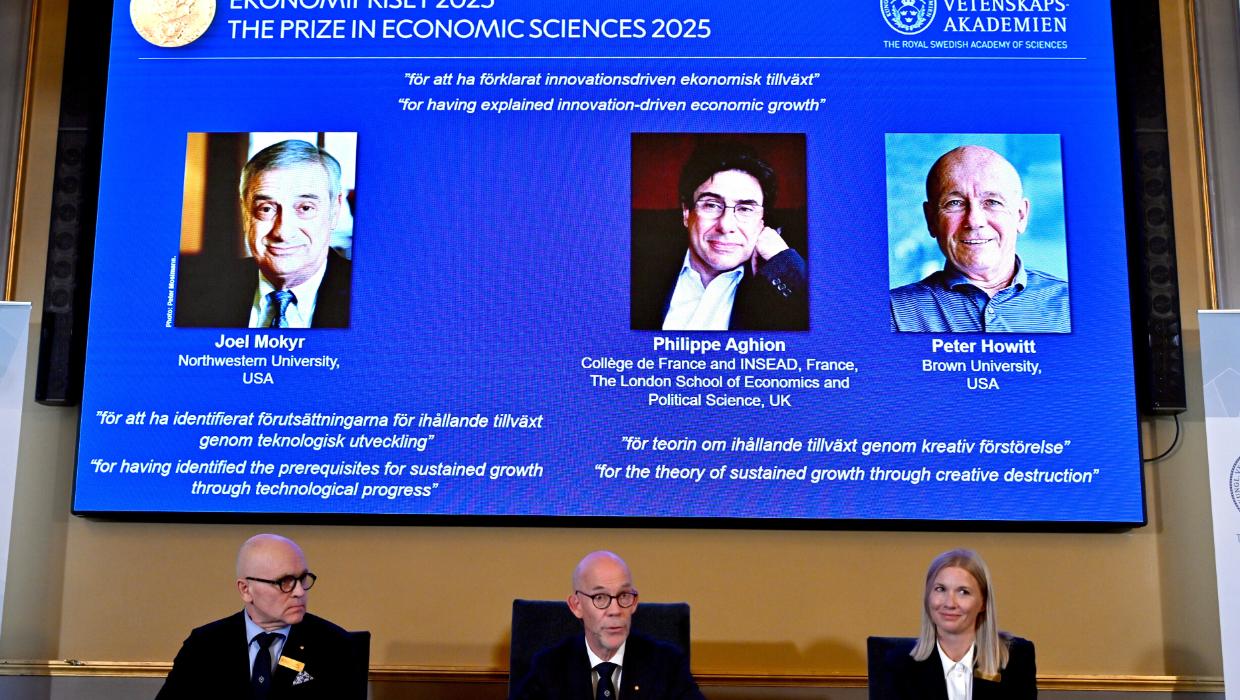Science
Economists Honored with Nobel Prize for Insight on Innovation

On March 18, 2024, three prominent economists—Joel Mokyr, Philippe Aghion, and Peter Howitt—were awarded the prestigious Nobel Memorial Prize in Economic Sciences for their groundbreaking research on innovation and its role in economic progress. Their work sheds light on the phenomenon of “creative destruction,” illustrating how new technologies and products can drive economic growth while simultaneously displacing older businesses.
The Nobel committee commended the trio for enhancing the understanding of how innovation disrupts established markets, a process that dates back to the Industrial Revolution. The committee highlighted their contributions to the concept of creative destruction, originally articulated by economist Joseph Schumpeter in his 1942 work, “Capitalism, Socialism and Democracy.” Mokyr, who is affiliated with Northwestern University, emphasized that successful innovations require not only functionality but also scientific explanations to sustain their impact.
Analysis of Economic Growth Mechanisms
Aghion and Howitt, who are associated with the Collège de France and Brown University respectively, provided a mathematical model that explores the dynamics of sustained economic growth. Their research indicates that markets dominated by a few large companies may stifle innovation, a concern relevant to sectors like telecommunications and social media. They advocate for policies that support workers affected by technological shifts, promoting not just job preservation but also social mobility, allowing individuals to transition into more productive roles.
John Hassler, chair of the Nobel committee, remarked on the importance of understanding the mechanisms behind creative destruction to prevent economic stagnation. He noted that innovation is crucial for maintaining growth, asserting that the winners’ work underlines the necessity of nurturing these processes.
Examples of creative destruction abound in modern economies. The rise of e-commerce has transformed retail, while streaming services have replaced traditional rental models. Similarly, advancements in digital advertising have disrupted print media. The automobile’s impact on horse-drawn transport serves as a classic illustration of this economic principle.
Broader Implications and Future Challenges
Mokyr has long been recognized for his optimistic view on technological advancements. In an era when many economists expressed skepticism about the economic impact of new technologies like smartphones, Mokyr argued that these innovations, though often inexpensive or free, provide significant societal benefits. He cited Spotify as an example of an innovation that has transformed access to music, illustrating his point about the often invisible economic benefits of new services.
Artificial intelligence (AI) emerged as a key topic in discussions surrounding innovation. Aghion expressed strong belief in AI’s potential to drive economic growth, contingent upon the right institutional frameworks and policies. He cautioned that established corporations in the AI sector could hinder competition, emphasizing the need for regulations that foster new entrants into the market.
Mokyr countered fears surrounding AI, dismissing notions that it could lead to human extinction as overly dramatic. Instead, he views AI as a valuable tool that can enhance human productivity by enabling workers to focus on more challenging and engaging tasks.
The Nobel prize, which includes a monetary award of 11 million Swedish kronor (approximately $2.02 million), was divided among the three laureates, with Mokyr receiving half and Aghion and Howitt sharing the remainder. Along with the financial reward, recipients also receive an 18-carat gold medal and a diploma.
Reflecting on the momentous occasion, Mokyr shared his surprise at receiving the award, recounting how he was notified early in the morning. Howitt, similarly taken aback, initially thought a reporter’s call about the prize was a prank. Aghion expressed his gratitude for sharing this honor with esteemed colleagues, underscoring the collaborative nature of their work.
As the global economy continues to evolve, the insights from these economists will remain pivotal in understanding and fostering innovation—an essential ingredient for economic vitality in today’s world.
-

 World4 months ago
World4 months agoTest Your Knowledge: Take the Herald’s Afternoon Quiz Today
-

 Sports5 months ago
Sports5 months agoPM Faces Backlash from Fans During Netball Trophy Ceremony
-

 Lifestyle5 months ago
Lifestyle5 months agoDunedin Designers Win Top Award at Hokonui Fashion Event
-

 Entertainment5 months ago
Entertainment5 months agoExperience the Excitement of ‘Chief of War’ in Oʻahu
-

 Sports5 months ago
Sports5 months agoLiam Lawson Launches New Era for Racing Bulls with Strong Start
-

 World5 months ago
World5 months agoCoalition Forms to Preserve Māori Wards in Hawke’s Bay
-

 Health5 months ago
Health5 months agoWalking Faster Offers Major Health Benefits for Older Adults
-

 Lifestyle5 months ago
Lifestyle5 months agoDisney Fan Reveals Dress Code Tips for Park Visitors
-

 Top Stories2 weeks ago
Top Stories2 weeks agoTongan Star Eli Katoa Shares Recovery Update After Surgery
-

 Politics5 months ago
Politics5 months agoScots Rally with Humor and Music to Protest Trump’s Visit
-

 Top Stories5 months ago
Top Stories5 months agoUK and India Finalize Trade Deal to Boost Economic Ties
-

 Health2 months ago
Health2 months agoRadio Host Jay-Jay Feeney’s Partner Secures Visa to Stay in NZ









